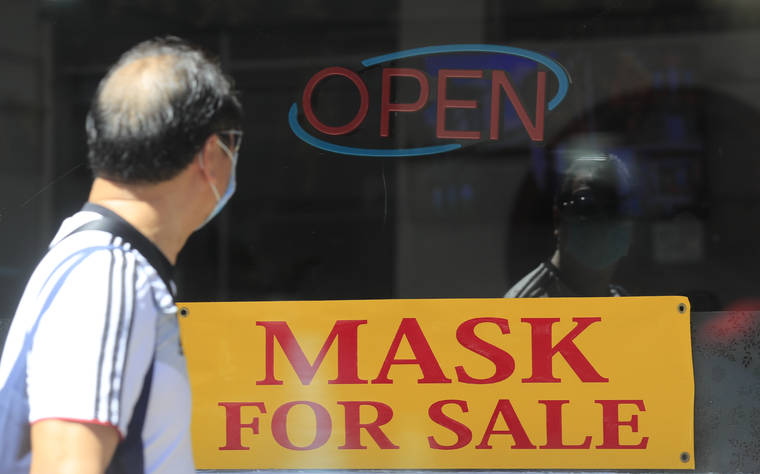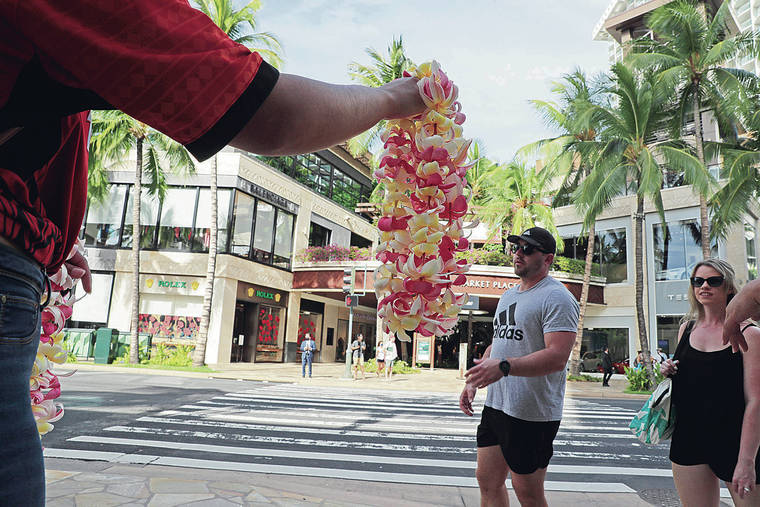Confusion about rules on mask-wearing is widespread across Hawaii

JAMM AQUINO / OCT. 24
A man wearing a face mask peers at a storefront sign advertising masks for sale along Maunakea Street.

JAMM AQUINO / OCTOBER 16
Kalihi resident Linda Pine passes out plumeria lei to passing pedestrians outside the Outrigger Waikiki Beach hotel.


Better communication is needed to inform tourists and residents that wearing masks is “mandatory,” said Gov. David Ige, who on Monday encouraged “everyone (to) continually remind people that masks are required in Hawaii.”
“I think we’ve all heard the science that it makes a significant difference,” Ige told members of the House Select Committee on COVID-19 Economic and Financial Preparedness. “That’s one way for us to ensure that we won’t have to implement more stringent restrictions if we can all take personal responsibility. … And we want to make sure that our visitors understand that it’s their personal responsibility to do the same.”
Since the state this month reopened trans-Pacific travel to tourists who test negative for the novel coronavirus before boarding an inbound flight, Ige said, his administration has worked with airlines and tourism travel partners “just to promote the notion and of the requirements here that masks are mandatory whenever they’re traveling in our state.”
Informational videos should have begun airing to arriving passengers “that masks are mandatory,” Ige reiterated.
But even members of the House Select Committee expressed confusion over mask rules across various island counties and asked Ige for a more consistent message.
On the state’s hawaii.gov Opens in a new tab website under a frequently-asked-questions feature about COVID-19 Opens in a new tab, a question titled “Should I wear a mask?” reads:
Don't miss out on what's happening!
Stay in touch with breaking news, as it happens, conveniently in your email inbox. It's FREE!
“If you are sick, wearing a face mask is recommended to help prevent others from being exposed to the droplets produced when you cough or sneeze.
“Cloth masks should be used by healthy people to cover their mouth and nose and help reduce the spread of disease in the community.”
A link from the state’s website to information from the Chamber of Commerce of Hawaii offers different information between the counties.
“Statewide,” according to the chamber, “all persons must wear face coverings in compliance with the county orders, rules and directives” punishable with a maximum misdemeanor penalty of $5,000 and a year in jail in every county.
While the penalties are the same, the rules vary and each county has multiple exceptions.
On Oahu, for instance, people are “Required to wear face coverings over nose & mouth indoors and outdoors in public spaces; when interacting with customers, visitors, and other employees; on public transportation; in gyms; all restaurant workers,” according to the chamber.
On Hawaii island and in Maui County, people are “Required to wear non-medical face coverings over nose & mouth while in public settings.”
But on Kauai, people are “Required to wear face coverings over nose & mouth in any close contact setting; by employees, customers & visitors when close contact may occur,” according to the chamber.
Ige’s comments about mask requirements were prompted by a plea from Tina Yamaki, president of the Retail Merchants of Hawaii, for more, bigger and more prominently displayed signs for tourists to wear masks, especially for arriving passengers at Daniel K. Inouye International Airport.
“What we’re seeing is the tourist is coming into our stores, and as soon as they walk out, they take off their mask or they’re not even wearing their masks because they say, ‘In our state we don’t have to do that,’” Yamaki told Ige. “We’ve had people say that the signage is so small (at DKI airport) that it’s hardly noticeable just to remind our visitors coming in.”
When it comes to mask-wearing messaging from state officials, Ige acknowledged that “certainly, we can do a better job on that.”
In his 30-minute appearance before the House COVID-19 committee, Ige also said state officials are about a week away from announcing plans to welcome Japanese visitors, and that Canadian and South Korean officials are right behind in their interest in a Hawaii “travel bubble” for their citizens to arrive here.
Ige also said that a widespread vaccine for COVID-19 won’t be distributed in Hawaii until at least late summer or early fall of 2021 and that administering it will be a “monumental undertaking.”
When a vaccine is available, Ige said, samples will be “very, very limited.”
Only 60% to 70% of the community — or 700,000 to 800,000 people — will receive the vaccine in two rounds separated four weeks apart, Ige said.
Based on Oahu’s earlier effort to “surge test” 60,000 people for COVID-19, vaccinating so many more people across the entire state in two rounds would be a “monumental undertaking,” he said.
Ige also said programmers are working to fix problems with the state’s Safe Travels, travel.hawaii.gov online application that collects travelers’ information, including their negative COVID-19 information, which initially led thousands of arriving passengers to quarantine after arriving.
One of the many problems, Ige said, is that passengers upload photos of their emailed negative COVID-19 tests rather than uploading the documents directly.
“There’s a lot of those kinds of nuances that we’re working through,” Ige said. “We do have quite a number of people trying to correct those errors.”



